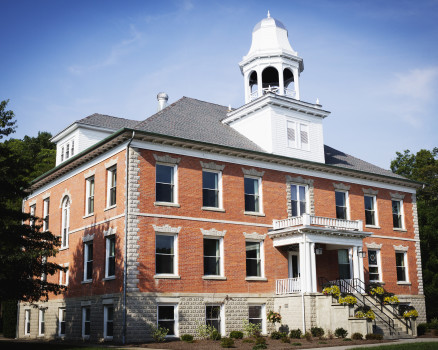Professor Linda Mills-Woolsey will be offering her thoughts on the importance of creative arts in a her valedictory lecture, entitled “Dangerous Arts: Reading and Imagination in a Post-Literate Era”. The lecture will take place in room 323 of the library on November 30 at 04:25 p.m.
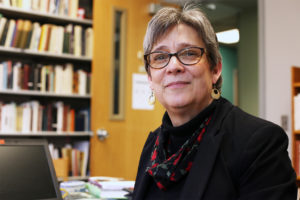 “I’ve been in school for 60 years. I went to first grad and I never looked back. Surely I learned something in that time,” announced Professor Mills-Woolsey. “The main challenge of the lecture is to not make it a rant.” The intention of valedictory lectures, according to Mills-Woolsey, is to reflect back on one’s career or present a piece of SCHOLARSHIP. She noted that she is not entirely doing either exactly, but rather focusing on the question “Why right now is there both so much dismissal of and suspicion of the more imaginative kinds of intellectual work?”
“I’ve been in school for 60 years. I went to first grad and I never looked back. Surely I learned something in that time,” announced Professor Mills-Woolsey. “The main challenge of the lecture is to not make it a rant.” The intention of valedictory lectures, according to Mills-Woolsey, is to reflect back on one’s career or present a piece of SCHOLARSHIP. She noted that she is not entirely doing either exactly, but rather focusing on the question “Why right now is there both so much dismissal of and suspicion of the more imaginative kinds of intellectual work?”
In her initial proposal for the lecture, she includes also a focus on “the decline of serious reading, the weakening of spiritual commitment, and the distrust of science”. She precedes her proposal with a quote by Carlos Ruiz Zafon: “Bea says the art of reading is slowly dying, that it is an intimate ritual, that a book is a mirror that offers us only what we carry inside us… and great readers are becoming more scarce by the day. Every month we receive offers to turn our bookshop into a store selling television, girdles, or rope-soled shoes.” In looking at the impact of a decreased interest in the imaginative arts, particularly reading, she mentioned there may also be connections to how we view truth, faith, and science.
Professor Mills-Woolsey admitted that a heavy focus of her lecture will reflect the focus of her career, literature. She explained her concerns that some people hold the perspective that they will believe not what they actually think to be correct, but rather what they prefer to think is correct. She commented, “You would think that a society where people are proudly saying ‘Oh, I don’t read fiction’ would be more attuned to truth and yet this is the era of fake news.”
She later explained that finding truth allows us all to work towards “being what God called us to be- how dare we neglect it- on the individual level, but also on the social level.” When explaining her inspiration for her lecture topic, she referenced a survey from the PEW Research center that found more Americans view higher education with suspicion, even thinking it a danger to society. She commented there may be reason to believe the weakening of faith and science may parallel the decreased interest in imagination.
“So how do we live the fullest human life? That’s what I’m most interested in.” She continued, “People want education that will lead to money and you don’t have people saying ‘I want the best life I can have. I think in the age of the robot we need to be thinking about what that best life means. And what are the skills that, at least for your generation, the robots can’t replace?” Professor Mills-Woolsey went on to explain that students rob themselves by only focusing on the skills they deem immediately marketable. There is evidence that not everyone is satisfied only studying bits and pieces; they want to commit themselves to longer works, as well.
“It’s easy to see things in terms of declension, that things are getting worse and worse and worse, and I think it’s much more complicated than that,” commented Mills-Woolsey. “I think our society is in some intellectual and moral danger, but I think we have the tools to confront that danger if we want to use them.”

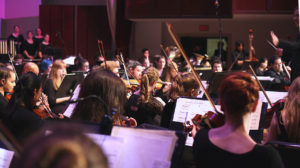 “Notably, we are doing music by Hank Mobley, Randy Brecker, Duke Ellington, Cedar Walton, Thelonious Monk, Chick Corea and Curtis Fuller,” Dr. Ken Crane, Director of Jazz Activities, explained of his ensemble’s concert. “Each of these composers are big-name jazz artists who influenced generations of jazz musicians—including us.”
“Notably, we are doing music by Hank Mobley, Randy Brecker, Duke Ellington, Cedar Walton, Thelonious Monk, Chick Corea and Curtis Fuller,” Dr. Ken Crane, Director of Jazz Activities, explained of his ensemble’s concert. “Each of these composers are big-name jazz artists who influenced generations of jazz musicians—including us.”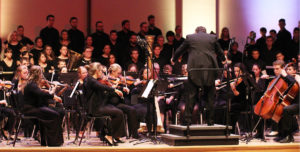 Its event description for the school calendar explained, “It will provide them with the opportunity to hear an orchestra perform in an informal setting and will also include things like instrument demonstrations and some dialogue between the host and audience about historical or general fun facts about the pieces.”
Its event description for the school calendar explained, “It will provide them with the opportunity to hear an orchestra perform in an informal setting and will also include things like instrument demonstrations and some dialogue between the host and audience about historical or general fun facts about the pieces.”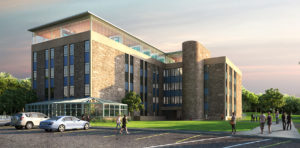 “It’s been in the works for years,” explained Karl Sisson, Vice President for Advancement and External Relations. “We’ve been driven by two things: we’ve had the need, but do we have the finances, from fundraising, to do it? And the move into engineering precipitates expansion.”
“It’s been in the works for years,” explained Karl Sisson, Vice President for Advancement and External Relations. “We’ve been driven by two things: we’ve had the need, but do we have the finances, from fundraising, to do it? And the move into engineering precipitates expansion.”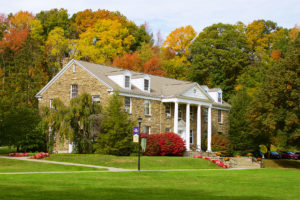 Pool’s focus, however, has fixed on examining how Houghton kept students coming back. “We had a pretty good rift last semester,” explained Pool at a recent SGA discussion forum on current retention rates. “We had a lot of students who were concerned about how the college was responding to, developing, supporting all of our students, certainly our students from underrepresented populations. How are we helping those students navigate, find support, feel integrated into the entire student population, and welcomed? These are questions that we’ve been working with pretty intensely since last spring.”
Pool’s focus, however, has fixed on examining how Houghton kept students coming back. “We had a pretty good rift last semester,” explained Pool at a recent SGA discussion forum on current retention rates. “We had a lot of students who were concerned about how the college was responding to, developing, supporting all of our students, certainly our students from underrepresented populations. How are we helping those students navigate, find support, feel integrated into the entire student population, and welcomed? These are questions that we’ve been working with pretty intensely since last spring.” “Many of these people possess great potential and are still able to make a significant contribution to society,” stated Houghton’s description of the new program. Later it explained “The curriculum will be rich in the kind of coursework that will emphasize personal and intellectual growth while also providing courses geared toward workplace readiness. “
“Many of these people possess great potential and are still able to make a significant contribution to society,” stated Houghton’s description of the new program. Later it explained “The curriculum will be rich in the kind of coursework that will emphasize personal and intellectual growth while also providing courses geared toward workplace readiness. “ While Houghton applies its established curriculum to a new audience, “PPWNY will market the program both inside correctional facilities and outside in the community through its established partnerships with DOCCS Parole Orientation, Erie County Reentry Task Force, Buffalo Employment and Training Center and the Department of Social Services.”
While Houghton applies its established curriculum to a new audience, “PPWNY will market the program both inside correctional facilities and outside in the community through its established partnerships with DOCCS Parole Orientation, Erie County Reentry Task Force, Buffalo Employment and Training Center and the Department of Social Services.” “My hope is that students will learn more about Luther and his ideas through our coursework and that this will be enriched and come alive by the opportunity to visit some of the places where he lived and worked,” expressed Peter Meilaender, professor of political science, who is teaching the “Luther as a Political Thinker” class. He continued, “The effects of a historical event like the Reformation are so deep and broad that five centuries later we are probably hardly even conscious of the ways it has shaped our culture. The individualism that is such a prominent feature of modern Western societies surely has important roots in the Reformation.”
“My hope is that students will learn more about Luther and his ideas through our coursework and that this will be enriched and come alive by the opportunity to visit some of the places where he lived and worked,” expressed Peter Meilaender, professor of political science, who is teaching the “Luther as a Political Thinker” class. He continued, “The effects of a historical event like the Reformation are so deep and broad that five centuries later we are probably hardly even conscious of the ways it has shaped our culture. The individualism that is such a prominent feature of modern Western societies surely has important roots in the Reformation.”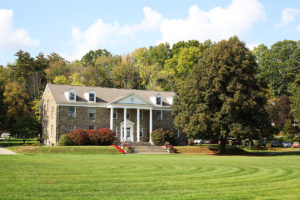 Murphy emphasized that the procedures are still in the process of being written. The most recent update available to her at the time of the interview was the “Dear Colleague” letter published September 22, 2017.
Murphy emphasized that the procedures are still in the process of being written. The most recent update available to her at the time of the interview was the “Dear Colleague” letter published September 22, 2017.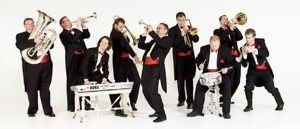 Ian Riley, Graduate Assistant, said that the series began “by the desire from our faculty to bring world-class musicians to Houghton to expose our students to various artists.” He went on to add that “the Greatbatch School of Music is purposeful to provide a wide variety of styles, size, and instrumentation; by hosting these distinguished artists from a vast array of musical backgrounds, we are able to present unique, aesthetically satisfying music experiences to the greater Houghton community.”
Ian Riley, Graduate Assistant, said that the series began “by the desire from our faculty to bring world-class musicians to Houghton to expose our students to various artists.” He went on to add that “the Greatbatch School of Music is purposeful to provide a wide variety of styles, size, and instrumentation; by hosting these distinguished artists from a vast array of musical backgrounds, we are able to present unique, aesthetically satisfying music experiences to the greater Houghton community.”